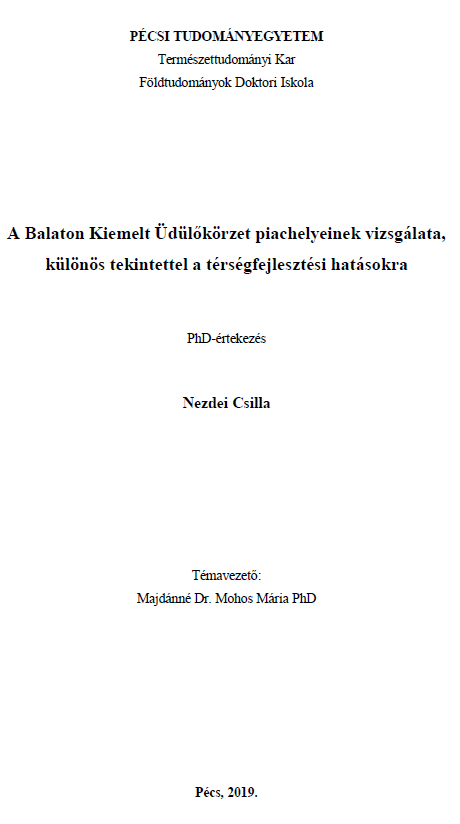A Balaton Kiemelt Üdülőkörzet piachelyeinek vizsgálata, különös tekintettel a térségfejlesztési hatásokra
Abstract
An analysis of the market places of Balaton Accentuated Touristic Zone, with special focus on regional development impacts --- Territorial development and regional development–two frequently mentioned concepts among international and Hungarian development trends, which equally aim at the improvement of the quality of life and a positive social andenvironmental change of a given region. They create better and more favourable chances (the concept thereof) as well as apply their system of institutions and instruments to emphasise their impact. In Hungary, the National Development2030 –National Development and Territorial Development Conceptprovides a framework for the long range development trends of value-creating and employment-creating economic development;a healthy and renewable society; the sustainable use of our natural resources, the preservation of our values and the protection of our environment; sustainable spatial structure based on regional potential. In territorial development, special emphasis should be placed on the complex assessment of the area, since in lack of social legitimation, the attempt to adopt international and/or Hungarian good practices will not have effect in the intervention area requiring development .Short supply chains emerged as a modernization trend in line with the European Union's rural development perspective (SSC); shortfood supplychains (SFSC); their design represents a novel tool for rural and regional development in line with Western concepts. Besides market placesasregional development tools related to SSC,the Hungarian government has created the legal framework for the local producer market, boasting an unbroken popularity in Western Europe and the United States for decades. Thesenovel instruments,similarly to certain elements of rural tourism (farmtourism, rural accommodation services, presentation of folk values, the design of petting zoos), is aimed at territorial and regional development. Their importance can be summarized in establishing a direct relationship between producer and buyer, in establishing, strengthening personal knowledge, increasing and diversifying the area cultivated, increasing product value, mobilizing the local economy, reducing transport costs, increasing employment and reducing unemployment. All this results in the stabilisation of the local social structure. One of the aims of the domestic development ideas is to re-establish the agricultural and food economy in rural and regional development, although the influence of the ownership, the asset pool and the skills or the solvent demand must still be considered.

